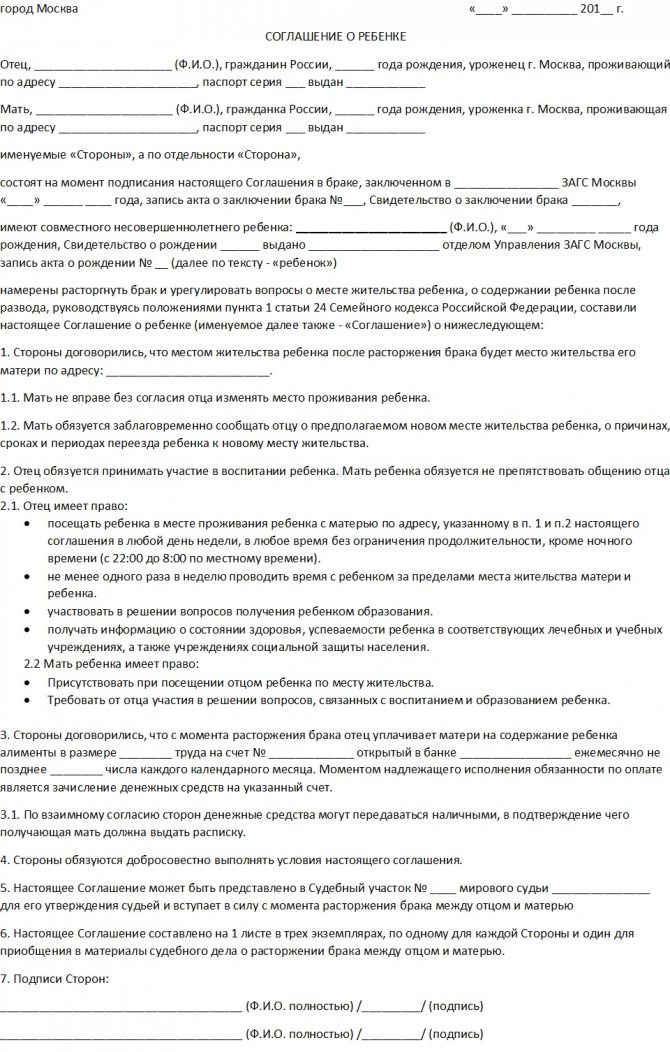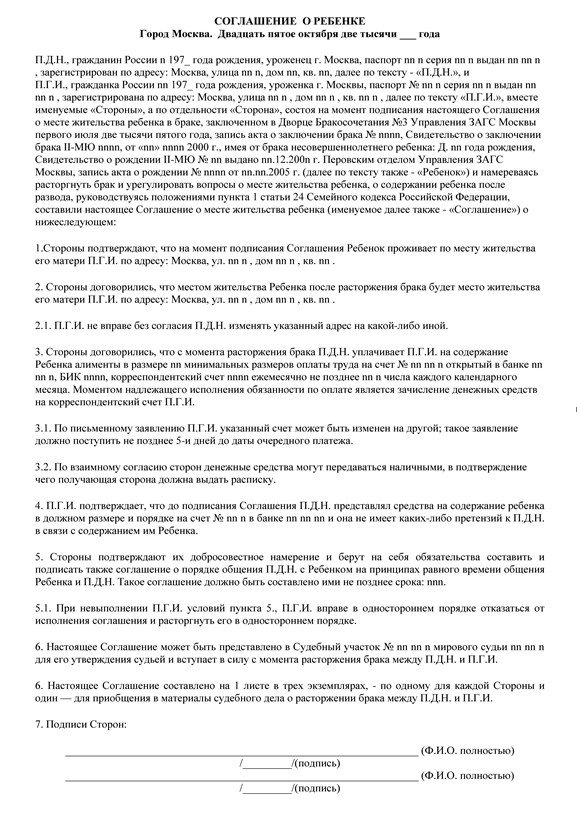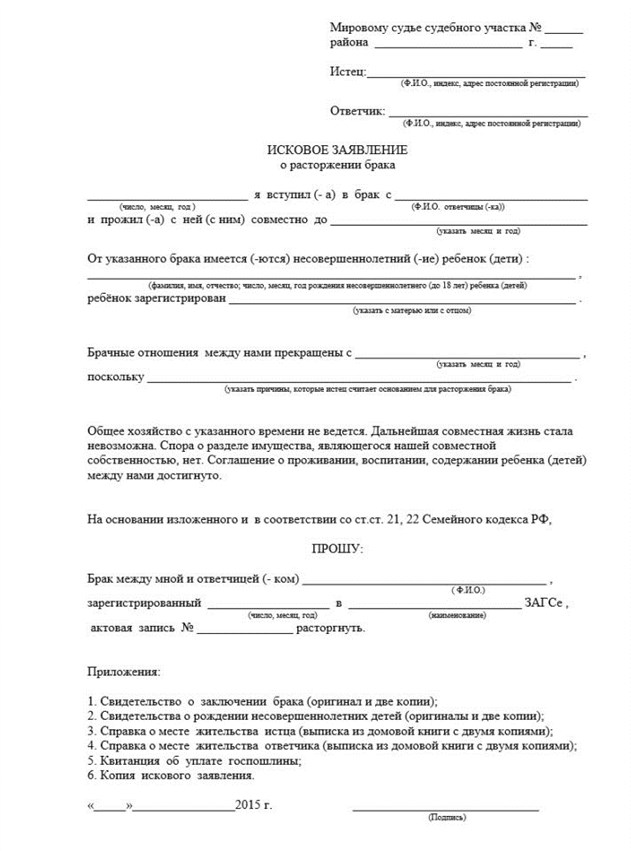Home / Divorces / Agreement on children in case of divorce
The divorce of a married couple who have common children who have not reached the age of majority (whether born or adopted) occurs exclusively in court. This provision of the law is intended to protect the rights of minor children when their parents divorce, to ensure court control over decent living conditions, physical and mental development, and upbringing.
Divorce proceedings often drag on when divorcing spouses have disputes regarding children. The court closely studies “children’s” issues in divorce proceedings, listens to the parties, is interested in the wishes of the children, requires additional documents and evidence, initiates checks, and orders a psychological examination. The court resolves the dispute on its own if the divorcing parents cannot reach a consensus regarding their future place of residence, financial support, and upbringing of children.
There are often cases when even a fair court decision, contrary to the wishes of the parents, is simply not implemented. If the court decision corresponds to the decision of the parents, the likelihood of its unquestioning implementation is much higher. That is why it is preferable for the parents themselves to come to an agreement and agree among themselves in advance on all “children’s” issues , thereby taking care of protecting the interests of the children and reducing the duration of the divorce process. This is the basis for the provision of the law (article - RF IC) on the possibility of concluding a parental agreement for children, which is submitted to the court and approved by the court in divorce proceedings.
Concluding an agreement is not an obligation, but only the right of parents; it helps to eliminate contradictions and disputes.
What is a parenting agreement for children?
Expert opinion
Dmitry Nosikov
Lawyer. Specialization: family and housing law.
According to Art. and the RF IC, divorcing spouses can conclude and submit to the court an agreement that contains their voluntary agreements:
- with which parent should minor children live together?
- in what order and amount should funds be paid for the maintenance of children.
If the parents do not submit an agreement to the court, or if the agreement concluded between them violates children's and parental rights, the court must independently resolve the issue of the place of residence and/or maintenance of the children.
Thus, a children's agreement is a written document that is entered into by parents for the benefit of the children during the divorce process and is approved by the court.
Principles for concluding a document:
- Voluntariness;
- No conflicts with family law;
- Creating favorable conditions for a child’s life (place of residence, financial support, health, development, upbringing);
- Respect for the rights of children and parents.
The parental agreement is not intended to provide additional rights to the mother or father, or to achieve the fulfillment of parental responsibilities, but rather to protect the rights of children, and to reach a compromise between parents regarding all important “children’s” issues:
- to avoid disputes, abuses, violations after divorce;
- to simplify and speed up the divorce process.
The benefits and disadvantages of an agreement on children during divorce
An agreement concluded with a notary has pros and cons. Advantages of an agreement on children during divorce:
- Parents can set any conditions convenient for them in the contract. For example, in court, officials are guided by laws. If, by law, one child is entitled to alimony in the amount of 25% of the parent’s income, this amount will be assigned during the divorce process. If necessary, the parties can independently agree to change the amount of child support.
- Stakeholders will be able to save their time. Contacting a lawyer and notary also requires expenses, but during litigation the process can drag on and entail additional costs.
- Maintaining psychological comfort. Lengthy legal proceedings in which children become the object of dispute can lead to psychological trauma for the child. Thanks to an agreement on children, disagreements during a divorce can be resolved quickly and without the involvement of strangers.
Of course, concluding an agreement is not at all necessary. It is permissible to simply verbally voice the conditions of future residence and maintenance, but in this case, if a conflict arises, it will not be possible to refer to the existing agreement.
There are few disadvantages of the agreement, but it is worth considering them before deciding to sign the documents. Sometimes it is better to deal with it in court if the spouse has a habit of putting pressure on his partner for his own benefit. Then it’s worth hiring a lawyer and speaking in court with his support.
Not all mutual consents can be approved by the court. If the contract does not take into account the interests of all parties, the court may reject it or declare it invalid.
When is the agreement concluded?
An agreement between parents about children is usually concluded in connection with the dissolution of a marriage.
It can be concluded...
- before the trial (and filed with the court along with the divorce claim);
- during the divorce proceedings (and presented to the court during the hearing).
Expert opinion
Semyon Frolov
Lawyer. 7 years of experience. Specialization: family, inheritance, housing law.
To be fair, it must be said that the law does not exclude the possibility of concluding a parental agreement after a divorce .
The fact is that the law does not impose strict requirements on the form of parental agreement (written or oral) (according to Art. - RF IC). Parents can verbally inform the court that there is no dispute between them regarding the children (for example, by mutual agreement, the children will live with the mother and receive financial support from the father). And as a result, you can quickly receive a court decision on divorce without lengthy proceedings.
And after the divorce, if disagreements arise regarding the place of residence of the children or alimony, the mother and father will be able to conclude a parental agreement in writing with a detailed and accurate statement of mutual parental rights and responsibilities (according to Art. - and 100 of the RF IC). True, for such an agreement to have legal force, it must be concluded in strict accordance with the law and certified by a notary - after all, the court will no longer be able to approve it.
Notarization
Does the agreement need to be notarized? The mother and father may verbally notify the court of their agreement. The law does not provide for a mandatory written form. Everything that is stated orally by the participants in the court session is recorded in the court decision. But if controversial issues arise after litigation, problems may arise, and you will have to go back to court. It is therefore recommended that you put your agreement in writing.
The only case when an agreement must be certified by a notary is if the document contains a clause on the procedure for transferring alimony payments. Notarization will give the agreement legal validity. It will be used as a writ of execution when applying to the bailiff service to collect alimony.
Basic terms of agreement between parents about children
So, the parental agreement may contain absolutely any provisions relating to joint minor children. The law does not establish any restrictions on the form and content of the document.
However, based on current practice, the parental agreement may determine ...
- which parent should the children live with after the divorce;
- in what order and in what amounts should a parent living separately pay child support;
- the procedure for incurring additional expenses and expenses for children;
- in what order should a parent living separately be involved in the lives of children;
- the order of meetings and spending time between children and a parent living separately.
This list includes the most pressing and important issues for many married couples. But, of course, it is not exhaustive. Relationships in every family are unique and exclusive, which means that the agreement must also contain unique conditions.
Before drawing up and signing a document, parents should involve their children in the negotiations and discuss in detail with them all complex issues, especially if they are already 10 years old. This approach indicates a high level of moral and intellectual maturity of the spouses, who care primarily about the interests of the children, and not about their own interests.
Which parent will the children live with after the divorce?
As practice shows, after a divorce, children more often remain with their mother. Especially if we are talking about a small child. It is permissible to violate mutual psychological and physical affection between mother and baby only for good reasons (serious illness, alcoholism or drug addiction, unfavorable living and material conditions).
Older children can live with their mother or father - based on the interests of the children (according to paragraphs 2-3 of Article 65 of the RF IC).
Parents can voluntarily agree on who their children should live with, taking into account not only their own desires, but also circumstances such as...
- housing and living conditions;
- level of material support,
- location of housing in relation to a school or preschool institution;
- the ability to care for a child;
- child's attachment to mother and father;
- child's desire.
The possibility of “dividing” children between parents cannot be ruled out. For example, a son stays with his father, a daughter stays with her mother.
Child support
Art. The RF IC obliges parents to support their children together from birth to adulthood. At the same time, parents have the right to independently determine the order and methods of supporting children together: provide food, buy clothes and shoes, pay for housing, pay for education, transfer alimony.
The parent with whom the children remain to live after the divorce is directly responsible for supporting the children, and the second parent living separately may be assigned child support obligations.
What will be the amount and procedure for paying alimony?
According to Art. 103 of the RF IC, the amount of alimony that is paid by voluntary agreement between parents should not be lower than the amount of alimony by law.
This means that the parent is obliged to pay...
- 1/4 permanent income - to support one child;
- 1/3 permanent income - to support two children;
- 1/2 permanent income - to support three, four, five children.
If a parent's income is variable, the amount of child support may not be a share but an exact amount. The amount of this amount will depend on the parent's income and the needs of the children.
A parent who lives separately can one-time transfer valuable property (for example, an apartment) or a large sum of money into the child’s ownership, which will provide all the life needs of the child until adulthood. But most often the parent takes part in providing for the child by regularly paying child support.
Procedure for raising a child
A parent who, after a divorce, will live separately from the child does not lose the right to raise, communicate, spend leisure time, make decisions regarding education, health, and recreation.
How will the parent exercise parental rights and responsibilities?
Mother and father can agree on the methods and order of meetings, spending time, and sharing leisure time:
- How many hours or days can a child spend with a parent in a month?
- Will these meetings take place on a specific schedule (specific days and times) or at any time without restrictions?
- Is the presence of a second parent necessary?
- In what places can a child see a parent?
- Ways for a child and a parent to spend time together during weekends, holidays, holidays, vacations?
Disputes about children during divorce
All disputes about children during the divorce of their parents (based on judicial practice) can be grouped into disputes:
- on determining the place of residence (residence) of children;
- establishing the procedure for communication between a parent living separately and children, his participation in the life of minors;
- setting deadlines and determining the amount of payment of funds for child support;
- challenging paternity.
To the list of disputes about children, you can also add situations of deprivation of parental rights, or rather, the plaintiff’s presentation of such a demand along with an application for divorce.
Some issues related to children during a divorce are raised by the court regardless of the will of the parties and are decided by it or by the former spouses without fail. These points are recorded in the minutes of the court hearing and the court decision. Others are considered only upon presentation of a corresponding demand by the plaintiff or defendant.
Issues mandatory for consideration by the court include (Clause 2 of Article 24 of the Family Code of the Russian Federation):
- where and with whom the children will live after the divorce;
- who will pay child support and in what order.
All other issues are considered independently and can be submitted to separate proceedings (see, for example, clause 13 of the PPVS dated 05.11.1998 No. 15).
How to draw up a parental agreement for children?
Russian legislation does not contain strict requirements for the form and content of a parental agreement regarding children.
However, it is desirable that the document be drawn up in accordance with the requirements of document flow, so that in the future no one will have doubts about its authenticity. The document must be concise, precise, and structured. The style of speech is formal business. Wording that may be ambiguously understood or interpreted is excluded.
Expert opinion
Dmitry Nosikov
Lawyer. Specialization: family and housing law.
Below is a universal sample parental agreement on the basis of which you can draw up your own document. It is for informational purposes only and contains basic provisions. You have the right to expand and supplement the document to any extent - based on the interests of the child and parents.
For example, include in the parental agreement provisions for the payment of alimony not only for the maintenance of the child, but also for the maintenance of the mother who cares for him.
If you have any questions or require legal advice, you can contact our lawyers - 24/7 chat support or call the hotline.
Form and content of the document
A parental agreement regarding children may contain the following clauses:
- Title of the document. Depending on what aspects of the parent-child relationship need to be streamlined during the divorce process, the document may be called differently:
- "Parental announcement about children"
- “...about the child’s place of residence”
- “... about the payment of alimony”
- “... about the procedure for communication and education by parents of a minor child.”
- Place of detention;
- Date of conclusion;
- Personal data of the parties - father and mother (full name, date of birth, passport details, registration and residence address);
- Personal data of children (full name, date of birth, residential address - with which parent?);
- General provisions (legislative acts governing the procedure for drawing up an agreement);
- Rights and responsibilities of the mother;
- Rights and responsibilities of the father;
- Place of residence of the child (with mother or father);
- The procedure for exercising rights and responsibilities by a parent living separately:
- provide for the child financially (amount and procedure for payment of sums of money);
- incur additional expenses for the child (pay for treatment, tutoring, recreation, entertainment);
- see the child (regularity, duration of meetings and telephone conversations);
- to raise a child;
- take part in the child’s education (choose a preschool, school, sports sections, clubs);
- take part in the treatment or recovery of the child (accompaniment in the clinic, joint stay in the hospital, trips to health centers).
- The procedure for a child’s communication with relatives of a parent living separately (grandparents, wife/husband, brothers and sisters);
- Procedure for resolving disputes between father and mother (extrajudicial, judicial)
- Duration of the agreement (for example, until reaching the age of majority);
- Parents' signatures.

One or more?
The law does not prohibit the conclusion of several agreements regulating different aspects of the relationship between parents and children. For example, one document will be devoted to child support obligations, another will regulate the order of upbringing, meetings and spending time between parents and the child.
In addition, it is possible to conclude several separate agreements for each child if there are several children in the family.
Simple written form or notarization?
As mentioned above, the parental agreement can be oral or written.
The law does not contain strict requirements for the form of parental agreement. Parents can...
- submit a completed written agreement to the court for consideration;
- verbally voice the agreements during the court hearing (with subsequent inclusion in the minutes of the court session and the court decision).
Need I say that a document drawn up in writing and signed by father and mother is preferable, since it will avoid disputes and misunderstandings between them?
Expert opinion
Dmitry Nosikov
Lawyer. Specialization: family and housing law.
The question is often asked: is it necessary to certify the parental agreement at a notary office? No, this is not necessary, but, of course, you can do this if you wish.
The only case when notarization is required is if the agreement contains agreements on the payment of alimony (amount, procedure, terms, details for alimony payments. Only if there is a notarization, such a document will have the legal force of a writ of execution and will allow alimony to be collected forcibly with the help of the Bailiff Service .
What issues are resolved through a children's agreement?
A children's agreement can address a number of issues related to children. In particular:
- where (with whom) will they live;
- how and on what days the second parent can visit them and take them home (with a schedule);
- who will pay for the services of tutors and studies in educational institutions;
- the scope of participation of each parent in certain issues, etc.
When agreeing on all issues regarding children, i.e. in the absence of a dispute regarding them, a claim for divorce should be addressed to a magistrate (clause 2, part 1, article 23 of the Code of Civil Procedure of the Russian Federation).
If the spouses cannot resolve the mandatory “children’s” issues, the plaintiff wishing to divorce applies to the district court.
The parties may themselves change or terminate an agreement entered into voluntarily. If a settlement agreement has been concluded and approved by the court, then it can only be changed or terminated in court.
Note! The existence of a dispute about the upbringing of children and the establishment of their place of residence is the basis for involving the guardianship and trusteeship authority in the judicial process. This body is obliged to submit to the court an inspection report of the residential premises (where the child is planned to live) and its conclusion on the merits of the dispute (Article 78 of the RF IC).
Documentation
When submitting a parental agreement to the court, it is not necessary to attach any documents to it, since the agreement is already an annex to the statement of claim for divorce, along with passports, marriage certificates, birth certificates of children, and other documents.
If additional documents are required during the trial, the court will request them.
Court approval procedure
During the divorce proceedings, parents can verbally voice their agreements regarding the children. If the agreements are drawn up in writing, it is necessary to attach the document to the statement of claim or submit it to the court for consideration during the court hearing.
The court will consider the terms of the agreement:
- will evaluate for legality (compliance with the norms of family and civil legislation);
- will check whether the rights of children or parents have been violated.
In addition, the court will listen and take into account the opinions of children over 10 years of age. Parents should ask the child’s point of view in advance, otherwise the agreements will not be considered by the court.
If the settlement agreement does not comply with the requirements of the law or contradicts the rights of parents or children, the court will personally consider the “children’s” issues and make a decision at its own discretion.
Execution of parental agreements
It is assumed that if parents have voluntarily agreed on the place of residence, maintenance, and joint upbringing of children, then they intend to fulfill the agreement.
But if the terms of the agreement reached and approved by the court are not fulfilled voluntarily, the parties have the right to rely on forced execution. A parent interested in transferring a child at his place of residence, paying alimony, meeting and spending time with the child can contact the Bailiff Service.
Expert opinion
Semyon Frolov
Lawyer. 7 years of experience. Specialization: family, inheritance, housing law.
Enforcement of a court decision and/or parental agreement occurs within the framework of enforcement proceedings.
For example, if a parent does not comply with the agreement to pay child support, the bailiff may seize the debtor’s cash savings or property, impose a fine, or bring the debtor to administrative or criminal liability. If a parent illegally retains a child, a bailiff can force the child to be transferred to the parent in accordance with a court decision and an agreement on the child’s place of residence. If the parent with whom the child lives prevents him from meeting and spending time with the other parent, with the help of a bailiff, you can enforce the court decision and agreement.
Read more in the article “I pay child support, but I don’t see the child” and “Alimony and the Bailiff Service”.
Information contained in such an act
This act is drawn up independently, without the participation of a notary. But if the agreement contains information about the payment of alimony, the notary must certify it. Only such a document is genuine; on its basis, one of the parents will make monthly payments. Do you have doubts about your knowledge of family law? You can resort to the help of specialized institutions - law firms. By contacting the justice authorities, the spouses can make a joint decision to enter into an agreement orally. The law of the Russian Federation stipulates that mother and father have the same right to raise a dependent in the event of a family breakdown. An agreement regarding children in a divorce must:
- solve the problem of the minor’s residence;
- determine the procedure for communication with children of a parent living separately;
- regulate the provision of upbringing, educational activities, and development of children during divorce;
- authorize financial security;
- describe other important points based on the opinions of the father and mother.
The uniqueness of the form expressing the agreement of the spouses regarding their common children is not defined by law. It is drawn up arbitrarily and contains absolutely any items at the discretion of the spouses. This act should not diminish the rights of parents and the interests of minors. It is useful to know what is the procedure for divorce if you have minor children?
When spouses divorce, an agreement on children may simultaneously include several documents: an agreement on parenting, an agreement on place of residence, an agreement on child support.
Consider an example of a typical settlement agreement that includes the following information:
- document's name;
- date, place of compilation;
- last name, first name, patronymic, date, place of birth, passport details, addresses of spouses (mother and father);
- details of minor children, their address, where they will live after the divorce;
- references to legislation;
- clarification of the rights of a parent living separately, methods of communication, upbringing, education;
- responsibilities of a parent living with children;
- the ability to take minors abroad;
- payment of alimony;
- additional expenses for mother and father;
- dispute resolution: negotiations or court;
- duration of the agreement;
- other conditions;
- signatures of mother and father.
By the way, a prenuptial agreement can be concluded both before and after marriage. Read more about how to correctly draw up a marriage contract: the subtleties and nuances of this procedure?
Sample settlement agreement for divorce 2017-2018:

If both parties sign the document, the statement of claim filed with the court looks like this:

Legal advice
Sometimes, by the time of divorce, the husband and wife are completely unable to conduct a dialogue and make joint decisions. Disputes, serious abuses (for example, forcible retention of a child, non-payment of child support), disagreements are not uncommon. Without the support of an experienced lawyer, obtaining justice can be difficult.
Some married couples still maintain mutual understanding, but difficulties arise with the legal side of the issue:
- How to file for divorce if you have children?
- How to respect the rights of the child, mother and father?
- How to prepare a parental agreement?
- How to include all the most important provisions in the document?
- How to avoid mistakes, violations, and ambiguous formulations?
- Is a simple written form sufficient or does the document need to be notarized?
If a husband and wife are not sure that they can draw up a document on their own, it is worth contacting professional lawyers who will not only provide a ready-made standard template, but will help them draw up an individual one based on the characteristics of family relationships.
Our lawyer can advise you right now. Ask your question via 24/7 support chat or hotline. Attention!
- Due to frequent changes in legislation, information sometimes becomes outdated faster than we can update it on the website.
- All cases are very individual and depend on many factors. Basic information does not guarantee a solution to your specific problems.
That's why FREE expert consultants work for you around the clock!
- via the form (below), or via online chat
- Call the hotline:
- Moscow and the Region
- St. Petersburg and region
- FREE for a lawyer!

By submitting data you agree to the Consent to PD Processing, PD Processing Policy and User Agreement.
Anonymously
Information about you will not be disclosed
Fast
Fill out the form and a lawyer will contact you within 5 minutes
Tell your friends
Rate ( 6 ratings, average: 4.33 out of 5)
Author of the article
Irina Garmash
Family law consultant.
Author's rating
Articles written
612








